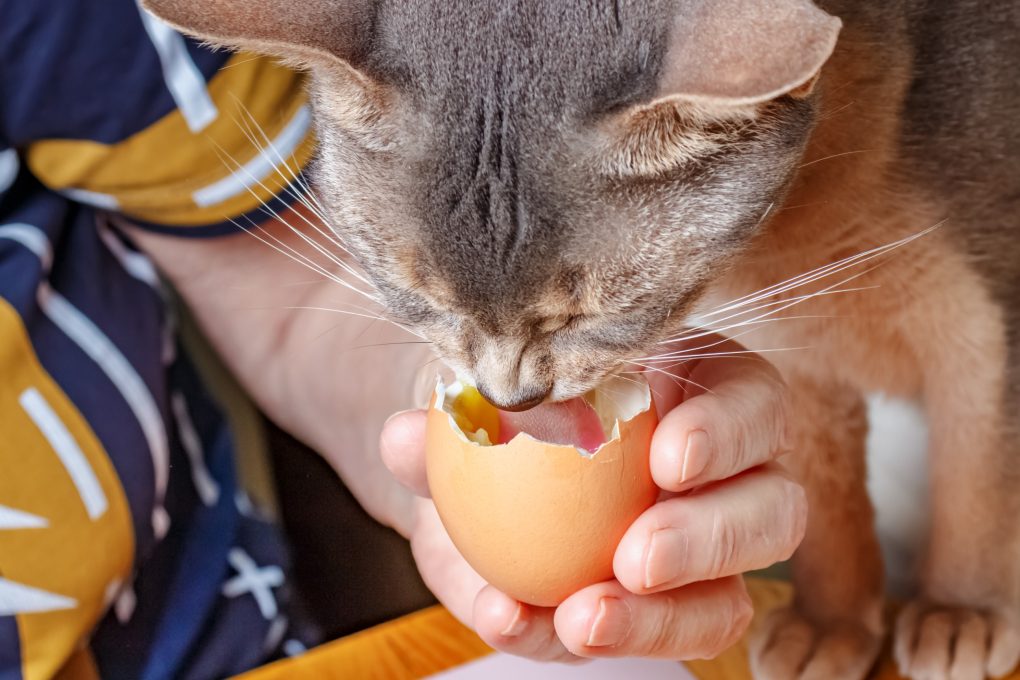Can Cats Eat Eggs: The Pros and Cons of Feeding Eggs to Cats
Yes, cats can eat eggs as they are a good source of protein. However, it is important to note that eggs should not be the primary source of nutrition for cats and should only be given to them in moderation.
Raw eggs should be avoided as they may contain bacteria that can cause cat illness. Therefore, cooking the egg and removing the shell before feeding it to your cat is recommended. Additionally, some cats may be allergic to eggs, so it’s best to introduce them gradually and watch for any signs of an allergic reaction.


Table of Contents
The Pros of Feeding Eggs to Cats
High Protein Content
Cats are obligate carnivores, requiring a diet high in animal-based protein to meet their nutritional needs. Protein is essential for building and repairing muscle tissue, maintaining healthy skin and fur, and supporting a healthy immune system.
Eggs are a good source of high-quality protein that is easy for cats to digest and absorb. The protein in eggs contains all the essential amino acids cats need to maintain optimal health. Eggs are considered a complete protein source because they contain all of the essential amino acids that a cat’s body cannot produce independently.
When cats consume protein, their digestive system breaks it down into amino acids, which are used to build and repair muscle tissue, produce enzymes and hormones, and support other vital bodily functions. Unlike plant-based protein sources, animal-based protein sources like eggs contain high levels of essential amino acids, which makes them an ideal protein source for cats.
Nutrient-Rich
In addition to being a good source of protein, eggs contain several vitamins and minerals essential for optimal health. For example, one of the key nutrients found in eggs is vitamin B12, which is important for healthy nervous system function and the production of red blood cells.
Cats cannot produce vitamin B12 independently, so they must obtain it from their diet. Eggs are a good source of this essential nutrient, making them valuable to a cat’s diet.
Another important nutrient in eggs is vitamin D, which is critical in calcium absorption and bone health. Vitamin D is also important for immune system function and can help protect against certain diseases. For example, cats can produce some vitamin D on their own through exposure to sunlight, but dietary sources like eggs can help ensure that they get enough of this important nutrient.
Eggs contain other important vitamins and minerals, including riboflavin, selenium, and choline. Riboflavin (vitamin B2) is important for healthy skin and coat, while selenium is an antioxidant mineral that can help protect cells from damage. Choline is an essential nutrient important for brain function and healthy liver function.
Digestibility
The digestibility of food refers to how easily the body can break it down and absorb its nutrients. Therefore, digestibility is important when choosing the right food for a cat, as cats have sensitive digestive systems and can be prone to digestive issues.


Eggs are a highly digestible food easily broken down by a cat’s digestive system. They are a source of high-quality protein that is easy for cats to absorb and use for important bodily functions, such as building and repairing muscle tissue.
In addition to being easy to digest, eggs are a gentle food that is unlikely to cause digestive upset in cats. This is particularly true when the eggs are cooked thoroughly and served without the shell, which can be difficult for cats to digest.
Cats with digestive issues, such as food sensitivities or allergies, may benefit from the digestibility of eggs. Because they are easy for the body to break down and absorb, cats with digestive issues may be better able to tolerate eggs than other protein sources.
The Cons of Feeding Eggs to Cats
High-Fat Content
Eggs are a relatively high-fat food; most fat comes from the yolk. While cats need some fat in their diet for energy and to support various bodily functions, consuming too much fat can lead to several health problems, including obesity, pancreatitis, and gastrointestinal upset.
Obesity is a common health problem in cats, and feeding a diet high in fat can contribute to weight gain. Excess weight can lead to various health problems, including joint pain, respiratory issues, and diabetes. Additionally, overweight cats are at higher risk for developing other health problems, such as urinary tract infections and liver disease.
Another potential health problem associated with a high-fat diet is pancreatitis. The pancreas produces enzymes that help break down food in the intestines. For example, a cat consuming a diet high in fat can strain the pancreas, leading to inflammation and damage. Pancreatitis can cause various symptoms, including vomiting, diarrhea, and abdominal pain.
Finally, a high-fat diet can also lead to a gastrointestinal upset in cats. Too much fat can cause digestive issues, such as diarrhea and flatulence. In some cases, cats may also develop a food intolerance or allergy to eggs, which can cause skin irritation, itching, and digestive problems.
Risk of Bacterial Contamination
Raw eggs can contain harmful bacteria such as Salmonella and E. coli, which can cause food poisoning in cats and humans. These bacteria can be found on the surface of eggshells and inside the egg, leading to symptoms such as vomiting, diarrhea, fever, and abdominal pain.
Cats can also spread bacteria to humans through their saliva, so it’s important to take precautions when handling raw eggs or feeding them to pets. To minimize the risk of bacterial contamination, cooking eggs thoroughly before feeding them to cats is recommended.
This can help to kill any harmful bacteria that may be present. Additionally, it’s important to practice good food safety hygiene when handling and preparing eggs, such as washing hands and surfaces with hot, soapy water and storing eggs properly in the refrigerator.
Allergies


While allergies to eggs in cats are relatively uncommon, they can occur and can cause a range of symptoms. Food allergies occur when a cat’s immune system overreacts to a specific protein in its diet. In the case of eggs, the protein most likely to trigger an allergic reaction is found in the egg white. However, some cats may also be allergic to the protein in the egg yolk or to both the egg white and yolk.
Symptoms of an egg allergy in cats can include gastrointestinal upset, such as vomiting and diarrhea, skin irritation, itching, and hair loss. In some cases, cats may also develop respiratory symptoms, such as sneezing and coughing.
Diagnosing a food allergy in cats can be challenging, as the symptoms can be similar to those of other conditions. For example, your veterinarian may recommend a food trial, which involves feeding a hypoallergenic diet that doesn’t contain common allergens, such as eggs, for several weeks. However, if the cat’s symptoms improve, this can suggest that they have a food allergy.
If a cat is diagnosed with an egg allergy, it is best to avoid feeding them eggs. This may require checking labels carefully, as eggs are sometimes used as an ingredient in commercial cat foods.
